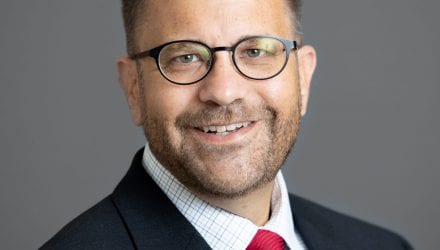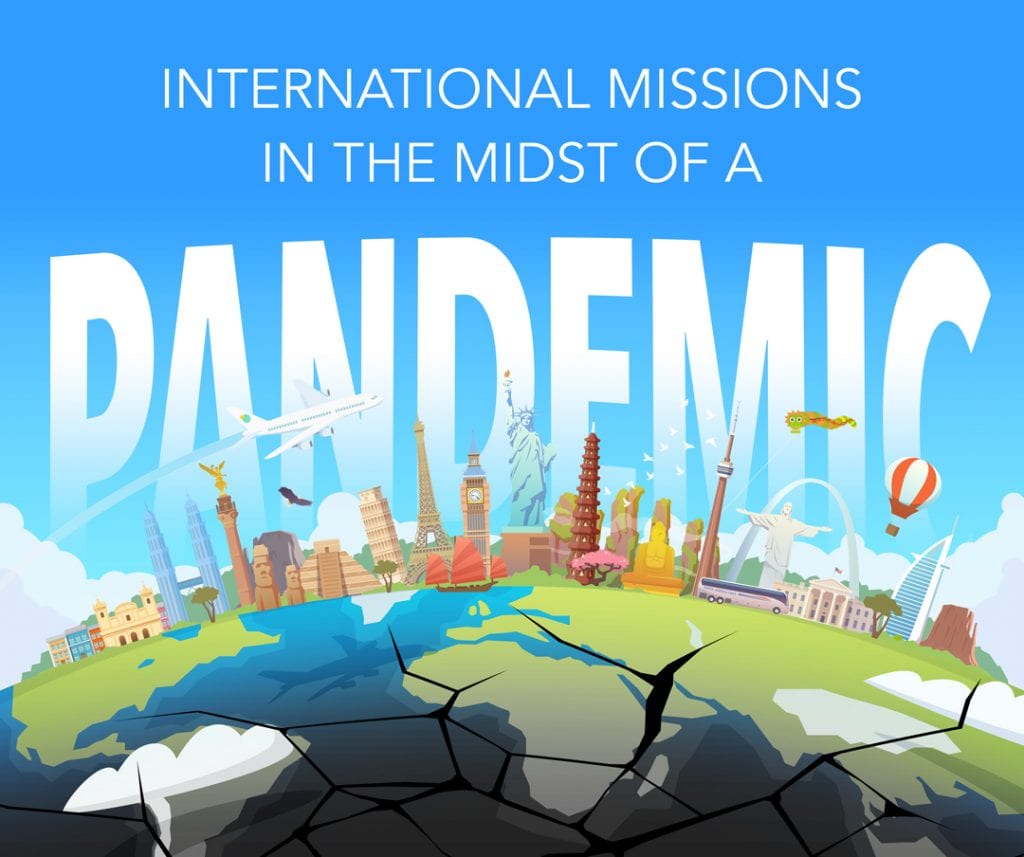
International Missions in the Midst of a Pandemic

We’ve seen the pandemic’s seismic impact on all types of organizations and industries at a local, state, and national level; and the international missions field is not exempt. We called on the experts: Dr. Thomas Stalter, professor of intercultural studies, and two alumni, Jeff (and his wife, Julie) Jones and Livviya Haarer, to help us gain insight on how to support and pray for missionaries in this time.
1.) How have you seen international missions affected by the pandemic?
Jeff and Julie: Like any other area of life, international missions have been hit hard by COVID. Some obvious ways are that some missionaries had to be evacuated. Most agencies pulled short term and intern staff back to the states. Some of these teams only had a two-hour notice and literally had to sprint to the last flight from their country. The long-term staff that has remained often face extreme isolation. In the Middle East, most countries made it illegal to leave one’s home or apartment, even for exercise or groceries. The governments would bring food and water to their doors. Some countries have closed their borders preventing teams from entering the field. Other countries have seen a decline in financial support due to the loss of jobs and the high unemployment rate as many missionaries are dependent on individual supporters. All in all, the mission field has been hit just as hard if not harder than the average field.
Dr. Stalter: COVID-19 is impacting travel logistics and causing family separation. In my last class on Zoom, I had a student in the Philippines who could not leave or he would not be allowed to reenter and be with his family. Other students, because of limited travel in their mission ministry, had more time to complete coursework. Opportunities to help people ill with COVID are quite limited because of the danger involved and the professional level of care necessary.
Livviya: Personally, I was planning to go to Costa Rica for a year to serve with missionaries that are under the organization of Score international. Then, my plan was to go to Nicaragua for about two years and serve with a church there. Due to COVID, I was not able to leave the country; my plan was to leave at the end of June but Costa Rica’s borders have been shut down. My contacts in Costa Rica and Nicaragua did have to stop some of their outreach at the very beginning of COVID, but mainly they were fully functional.
I am currently working two different jobs, saving up for my future trips, and trying to spend more time with God and figure out what/when my next steps will be.
2.) Do you think that border control will tighten even after the pandemic “subsides,” making it harder to get into certain countries?
Jeff and Julie: I personally do not think so. I will use the Middle East as an example. Some countries are experiencing up to a 20% population loss because of COVID. This percentage has nothing to do with death or illness. With economies closing down, investors and foreign workers are returning to their native countries. If you include the fact that tourism is nonexistent (and some countries depend on tourism), the economic deviation of COVID is going to be huge. This should make it easier after COVID to enter countries because they are going to be desperate for foreign income and residents to return to their economies. We are already forecasting a decrease in our overseas rent for the next couple of years because renters need people to fill their empty apartments. So that’s a huge plus there.
Dr. Stalter: I think border control may be tighter in some places after COVID passes. The major problem may not be a threat of disease, however, but rather the anti-Christian movement in China that may encourage other countries that consider Christianity toxic to take a stronger stand against it. Our own country is quickly becoming post-Christian. We had a Bible burning among the riotous situation in Portland last week, just 40 minutes from my home here in Oregon. A statue of Jesus was beheaded in Florida the same week.
3.) Do you have any projections of what this will mean for international missions long-term?
Jeff and Julie: It’s hard to say, but one thing is for sure: international missions will persist. Julie often says, “a lot of things may have been canceled due to COVID, but the Great Commission hasn’t been”. Church planting ministry might struggle with reduced gathering sizes and a lack of giving. Medical missions will certainly be busy. I anticipate campus ministries struggling as social distancing and masks might become norms of the future. At some campuses, non-residents are not allowed in dorms, and study/gathering spaces will be closed if social distancing cannot be properly monitored. If anything, COVID has shown the world the importance of community and being a part of a body. All in all, I think COVID has greatly affected international missions right now and yes, there have been negative aspects to it, but it has caused us and others in missions to think creatively, experiment with new strategies, and pray more. I think this will help international missions in the long-term as we will have new ideas and be more willing to try new things. We will rely on God more, and hopefully, empower students more.
Livviya: I have thought about this a lot during these times. There are missionaries here in the states that can’t go back to their homes in other countries; there are missionaries who cannot come into the states to visit family. I wonder if this will cause them to be more cautious about going back and forth. However, I’ve been thinking more about how this could affect short-term missions. I think people might be concerned about leaving for a week or two because they might have to quarantine afterward. I believe that if someone is obeying God’s call, they will not be affected by a pandemic or anything else. If they are going for themselves, they might be hindered by a virus.
4.) We’ve seen stories on Encompass World Partners’ site about the hope that remains in their locations in the field. Have you heard similar stories from organizations you follow/support?
Jeff and Julie: I would say there is a lot of hope. There certainly are challenges ahead, but we have the Holy Spirit. God’s not surprised by any of this and is in fact working through it. We are astounded by how God has brought hundreds to Christ in the Middle East due to COVID, and in some places, they are experiencing record amounts of giving as believers are stepping up in a time of need. There is a lot of reason to be hopeful.
Dr. Stalter: This seems to be similar for most international missions agencies I am aware of at this point. I would expect to hear that, however, since these agencies have the hope that the Gospel holds out to people around the world. There is no less hope now than before, though the desperate times make it seem more urgent.
Livviya: Whenever I connect with those in Costa Rica and Nicaragua, they are not swayed by this pandemic. It’s just another part of the world that is an obstacle to them spreading the gospel and reaching out to others. They are believing God is and will continue to be in control and intervene.
5.) What are some ways that you think God will redeem the pandemic and use it for His glory?
Jeff and Julie: With shelter in place globally being far harsher than in the states and much of our staff having to return to America, we asked ourselves, how do we reach those seeking in the Muslim world? Something we have talked about for years, but never fully utilized, was digital tools and in particular, social media ads. We started running two ads, one for Muslim secret seekers of Jesus and one for empowering believers in the Arab world. We’ve seen over 300 college students put their faith in Christ since March! Young Muslim men and women have been messaging us, hearing the Gospel, and surrendering to Jesus. From there we’ve initiated discipleship networks with these new believers and are hoping to gradually connect these MBBs (Muslim Background Believers) to each other. In the Arabian Peninsula, we watched 23 believers lead 102 of their friends to Christ in the last three months! This is unheard of in the Middle East. Imagine when COVID is over and people are not restrained to just texting and phone calls. Imagine what could happen when people can gather, have face-to-face interactions, and live life with one another. These students’ peers will be able to see God’s transformation in their lives!
Dr. Stalter: God can and will use the pandemic in his providential movement in the world to bring people to himself in terms of the opportunities it begets and the false hope of life without him it exposes. The brevity of life could not be a more poignant consideration than in these days.
Livviya: I think God is working through this pandemic. In my own life, He’s teaching me to trust in Him and wait on Him. He is teaching me to be on the journey instead of anticipating the destination alone. I understand God is always moving and working, and I believe He has been working on His people in this journey of the pandemic.
6.) What should our response as the church be to these challenges? How should we be praying for missionaries at our churches?
Jeff and Julie: Enter into the suffering and reach out to others who might be suffering to show them love and care. Isolation has really hurt a lot of missionaries — especially if missionaries are stateside. They may be torn between two worlds and lack close community. In terms of how to pray. Pray for open doors, a vaccine to be made so we can reach people in person, and healing from sickness or emotional trauma.
Dr. Stalter: I think we should pray for our missionaries, as for all the people of Christ, that God will bring opportunities into our experience with those outside Christ. Our mission is the same, but the times provide a context of urgency we must not overlook.
About the Interviewees:
Jeff and Julie Jones are missionaries to the Arab world. Jeff graduated from Grace College doubling Biblical Studies and Intercultural Studies and an M.A. in Intercultural Studies from the Seminary in 2017. His wife, Julie, studied Biology at James Madison University in 2017.
Dr. Stalter has served at Grace College & Seminary as a professor of Intercultural Studies for 20-plus years. Prior to teaching, he devoted 18 years of service in Africa. He graduated with an undergraduate degree from Grace in 1974, obtained his Th. M. from Dallas Theological Seminary in 1979, conferred his D.Miss. from Western Seminary in 1993, and went on to work on post-doctoral studies on Cultural Anthropology at Trinity Evangelical Divinity School in 2006.
Livviya Haarer graduated in 2019 with a double major in Spanish and Communication. She had plans to do international missions in Costa Rica and Nicaragua for the coming years but is in a season of waiting and praying due to the pandemic.
